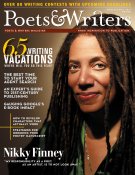In 1995, during the early stages of his career as a novelist and his life as a father, Michael Chabon embarked on his first residency at the MacDowell Colony in Peterborough, New Hampshire. Seizing this coveted solitary time, Chabon worked on the manuscript that became his Pulitzer Prize–winning novel, The Amazing Adventures of Kavalier and Clay (Random House, 2000). This initial residency led to eight repeat visits, the most recent of which saw the beginnings of his seventh novel, “Telegraph Avenue,” which he hopes to complete sometime this year. Now, after years of writing at the colony, Chabon has taken on a new role: chair of MacDowell’s board of directors. He succeeds author and journalist Robert “Robin” MacNeil, a seventeen-year veteran of the post. Shortly after Chabon stepped into the position last December, he spoke about his dedication to the colony and about making the most of the MacDowell experience.
Is the chair something you applied for?
It came as a complete surprise. When I got a message from a representative of MacDowell saying she wanted to talk to me about the search for a chair, I was certain they were calling me to suggest possible candidates. My wife [writer Ayelet Waldman, who is also a MacDowell alum] said, “They must be planning to ask you.” I said, “Yeah, right.”
What are some of the responsibilities of the position? Do you have specific plans for your tenure?
The big responsibility, according to Robin MacNeil, is presiding over and making a speech at the annual Medal Day ceremony in August. Other than that, [the post] seems to involve a lot of lending of my august presence. I am now clandestinely engaged in an eager campaign to buy up surplus quantities of augustness, on Craigslist and eBay mostly. Seriously, I plan to throw all my passion, support, and efforts into furthering whatever course is set by the amazingly gifted and able executive director, Cheryl Young, and resident director, David Macy, along with the staff and the board, and to try to bring some of the special perspective I have as someone who has spent a lot of time working, writing, at MacDowell…someone who has gratefully benefited from the original blessing bestowed by Mrs. and Mr. MacDowell back in 1907.
I’m sure you’re still learning the ropes to a certain extent. Have you come across anything surprising?
I did not expect the epaulets to be so heavy!
You’ve been to MacDowell nine times. What does it mean to you as a writer?
I get my work done. Even with four kids and an active life, I get my work done. But what I can’t seem to do anymore is utterly, completely lose myself in the work. To do your very best work as an artist, whatever the discipline, takes complete immersion in the work. You need to get caught in the slipstream, to draft along behind it as it carries you forward. You get into a state where, even when you’re not writing, everything you see, read, hear; every place you go; every newspaper you pick up; every conversation you chance to overhear feeds the work, because you are so saturated in it. That state is pretty well impossible for me to get into at home. Kids keep you, bless them, on the brilliant surface of life. At MacDowell, I fall into my work within about twenty-four hours—deep, deep, deep—and do not reemerge until the day I sign my name on the “tombstone” in my studio. The whole place is magical. It should be impossible; yet it exists.
Do you have any advice for people applying for a residency?
In my experience there are three reasons to come to MacDowell: (1) to start something new, (2) to make progress when you’re in the middle of something, and (3) to finish something. If you fit in one of those categories, go for it. And once you’re there, honor the beautiful intention of the place, and all the incredible effort and energy and imagination and enthusiasm that goes, every day, into making it function so well, by working your ass off.
Catherine Richardson is Poets & Writers Magazine’s Diana and Simon Raab Editorial Fellow.








